Salary Raise Letter Template for Professional Requests
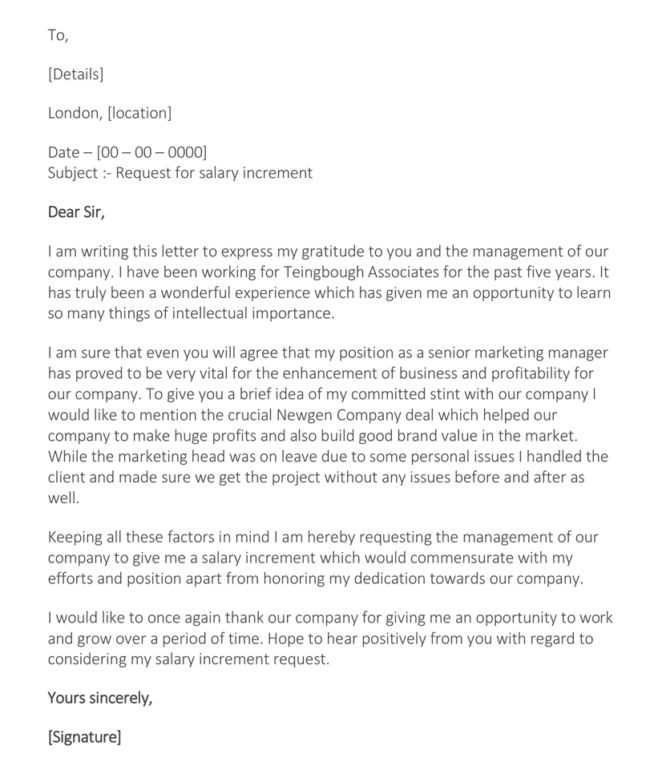
Asking for a higher compensation can be a delicate process, requiring careful preparation and the right approach. Whether you feel that your contributions have earned recognition or that the market value for your position has changed, it’s important to present your request in a well-crafted manner. A written appeal is one of the most effective ways to ensure your request is taken seriously, allowing you to clearly express your reasons and expectations.
Constructing a well-thought-out request can significantly improve your chances of success. It’s essential to highlight your achievements, skills, and contributions to the company, while also demonstrating why you deserve the proposed adjustment. The tone of the message is key, as it should remain professional and confident without being presumptive or confrontational.
In this guide, you’ll find tips and strategies for creating a persuasive and respectful request, helping you make your case effectively. Whether you are addressing a supervisor or HR, following these guidelines will help you make a strong impression and communicate your needs with clarity and professionalism.
Understanding the Importance of a Formal Request
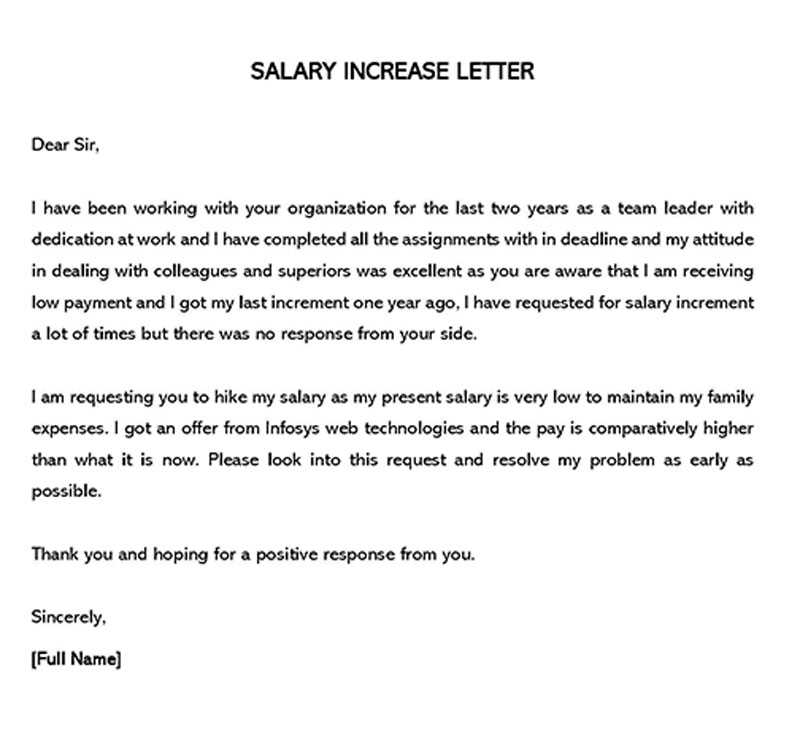
When seeking a compensation adjustment, it’s crucial to present your request in a structured and respectful manner. A well-crafted message ensures that your reasons are communicated effectively, increasing the likelihood of a positive outcome. By writing down your appeal, you not only demonstrate professionalism but also create a lasting record of your request for future reference.
The content of your request should focus on key aspects such as your contributions, accomplishments, and any factors that support your desire for a compensation adjustment. Being clear and concise while maintaining a respectful tone is essential for conveying your message appropriately. A well-written appeal can provide a compelling argument for why an adjustment is warranted, making your case more persuasive to the recipient.
Why You Need a Raise Request
Asking for an increase in your compensation is a critical step in advancing your career and recognizing your value within the company. A formal approach provides an opportunity to outline your achievements and contributions, presenting a clear case for why an adjustment is deserved. It also demonstrates that you are proactive and professional in managing your career growth.
Without a proper written request, your hard work and dedication may go unnoticed, especially in a busy work environment. Crafting a compelling appeal allows you to communicate your worth and articulate why the proposed adjustment is aligned with your responsibilities, market standards, and company goals. This formalized approach increases the chances of receiving the desired response and ensures that your efforts are recognized in a meaningful way.
Key Elements of a Salary Appeal
When requesting an adjustment to your compensation, several key factors should be clearly highlighted to strengthen your case. These elements demonstrate your value to the company and provide a solid foundation for your request. A well-structured appeal includes a balance of factual support and professionalism, ensuring that the recipient understands both your contributions and the justification behind your request.
| Element | Description |
|---|---|
| Professional Achievements | Highlight specific accomplishments and how they’ve positively impacted the company or team. |
| Market Research | Provide evidence of industry standards or similar positions to back up the need for an adjustment. |
| Current Job Performance | Emphasize your current contributions, responsibility, and commitment to the company’s goals. |
| Respectful Tone | Maintain a professional, courteous tone throughout the appeal to ensure the message is received positively. |
These elements, when properly incorporated into your request, create a compelling argument for the adjustment you are seeking. By focusing on these aspects, you ensure that your appeal is well-rounded and has the best chance of success.
How to Address Your Employer Professionally

When making a formal request for a compensation adjustment, it’s crucial to approach your employer with respect and professionalism. The way you address your manager or HR representative plays a significant role in ensuring your message is well-received. A thoughtful and polite tone sets the foundation for a positive conversation, making it easier for the recipient to understand your request and consider it carefully.
Key Considerations for Addressing Your Employer
- Start with a formal salutation such as “Dear [Name],” to establish a respectful tone.
- Use professional language and avoid being overly casual or demanding.
- Be clear and concise, stating your case without unnecessary elaboration.
- Remain polite, regardless of the outcome, to maintain a positive professional relationship.
Maintaining Professionalism Throughout Your Appeal
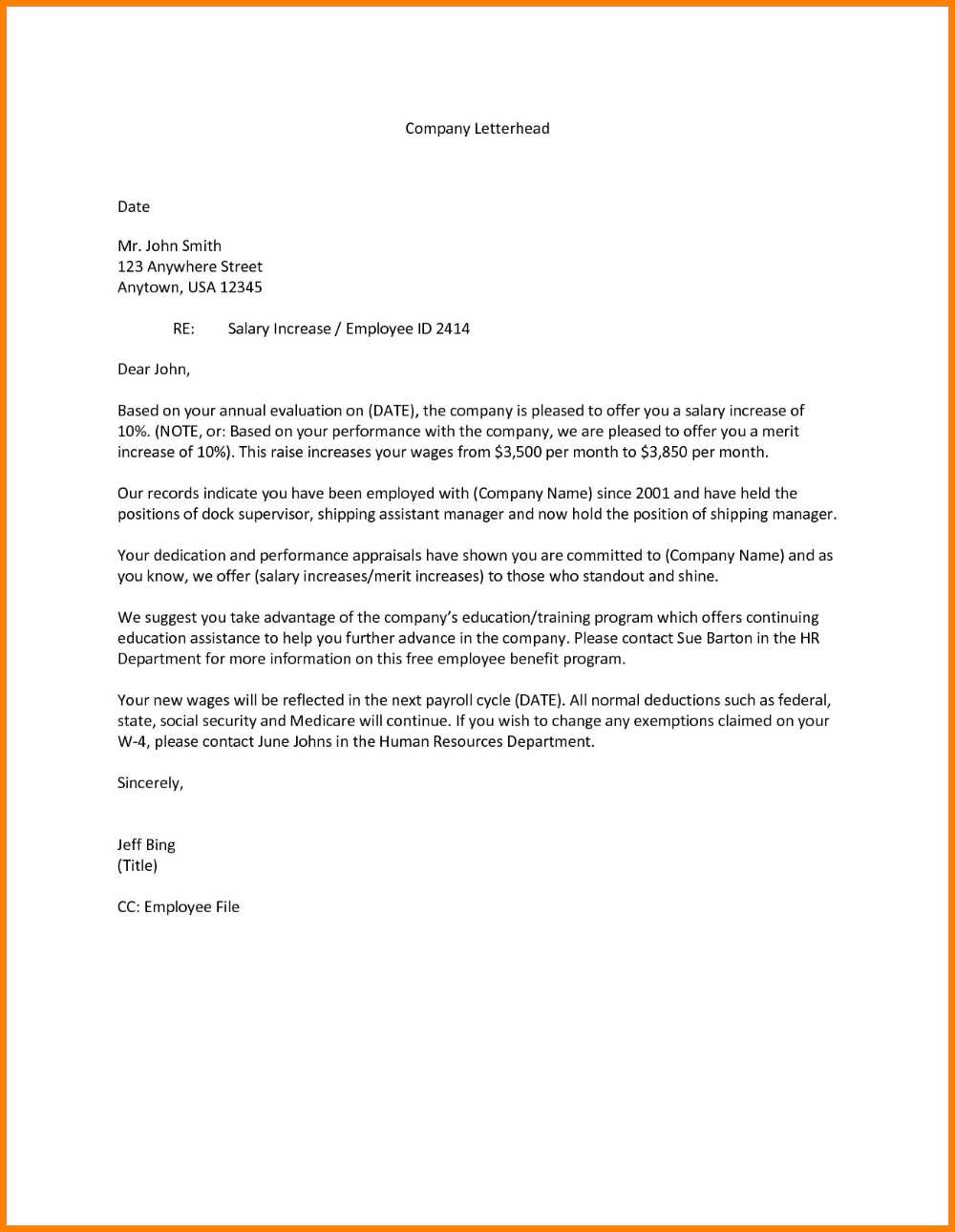
- Clearly outline your achievements and justify your request with evidence.
- Express appreciation for the opportunity to discuss your compensation in a respectful manner.
- Follow up with gratitude, regardless of the decision made.
By adhering to these guidelines, you ensure that your appeal is not only effective but also reflects a high level of professionalism, which can positively influence the outcome of your request.
Common Mistakes to Avoid in the Letter
When crafting a formal appeal for a compensation adjustment, there are several common mistakes that can undermine the effectiveness of your message. Avoiding these errors ensures that your request is taken seriously and has the best chance of being considered. By being mindful of tone, clarity, and structure, you can prevent your appeal from sounding unprofessional or lacking substance.
- Being too vague: Avoid making a request without backing it up with clear reasons and evidence of your contributions. Being specific about your achievements is crucial.
- Using an overly casual tone: A formal request requires a respectful and professional tone. Avoid informal language or slang that could diminish the seriousness of your appeal.
- Making unrealistic demands: It’s important to ensure that the amount you’re requesting aligns with industry standards and your role within the company. Setting expectations too high can hurt your credibility.
- Failing to express gratitude: Always show appreciation for the opportunity to discuss your compensation. Being respectful and courteous, even if the response is not favorable, helps maintain a good relationship with your employer.
- Neglecting to proofread: A simple mistake in grammar or spelling can make your appeal appear rushed or careless. Always double-check your message before sending it.
By avoiding these common pitfalls, you ensure that your appeal is both professional and compelling, improving your chances of achieving a favorable outcome.
Tips for Crafting a Persuasive Request
Creating an effective and convincing request for a compensation adjustment requires a strategic approach. To increase the likelihood of a positive response, your appeal must be well-crafted, clear, and compelling. Focus on presenting your case in a way that highlights your contributions, the value you bring to the company, and the rationale for the adjustment you seek. A well-thought-out approach can significantly influence the outcome of your request.
- Be clear and concise: Keep your message focused and to the point. Avoid unnecessary details and be direct about the adjustment you’re seeking.
- Support with evidence: Back up your request with specific examples of your achievements, contributions, and the impact you’ve made within the organization.
- Research industry standards: Show that your request aligns with what is typical in your field or for similar positions within the company to add credibility to your appeal.
- Be confident but respectful: Approach the discussion with assurance in your worth, but always maintain a respectful and professional tone.
- Frame your request positively: Present your appeal in a way that emphasizes your continued commitment and enthusiasm for your role and the company’s success.
By following these tips, you can create a persuasive and well-supported request that stands out and maximizes the chances of a favorable response.
Timing Your Salary Adjustment Request
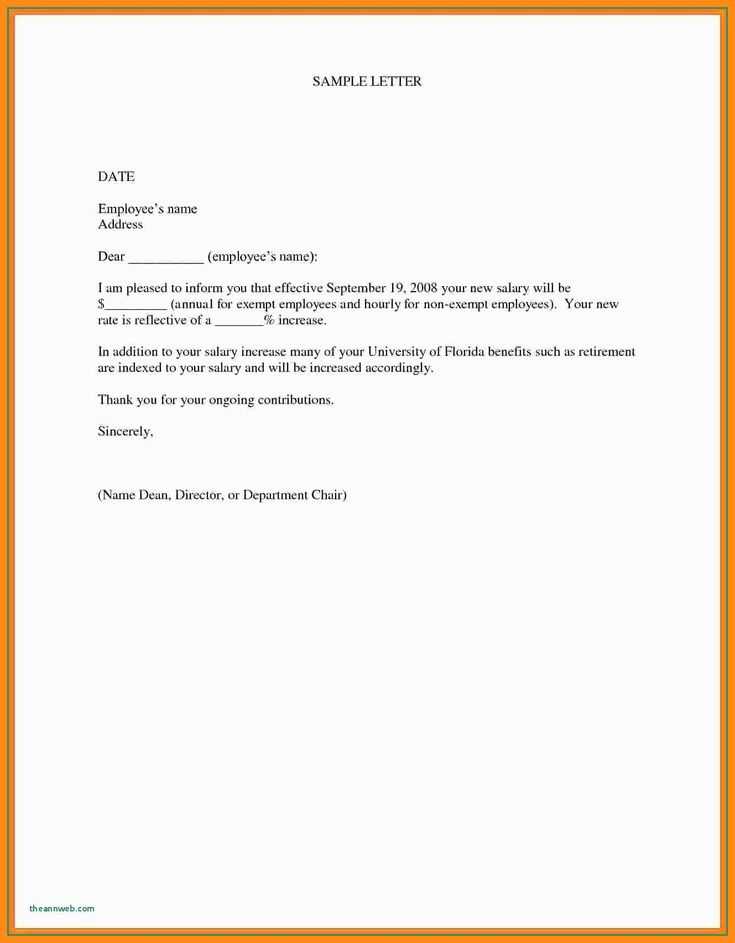
Choosing the right moment to present your request for a compensation adjustment can be just as important as how you craft it. Timing influences how your appeal is received and can significantly affect its outcome. Understanding when to bring up the conversation will allow you to align your request with favorable conditions, increasing the likelihood of a positive response.
Key Considerations for Timing
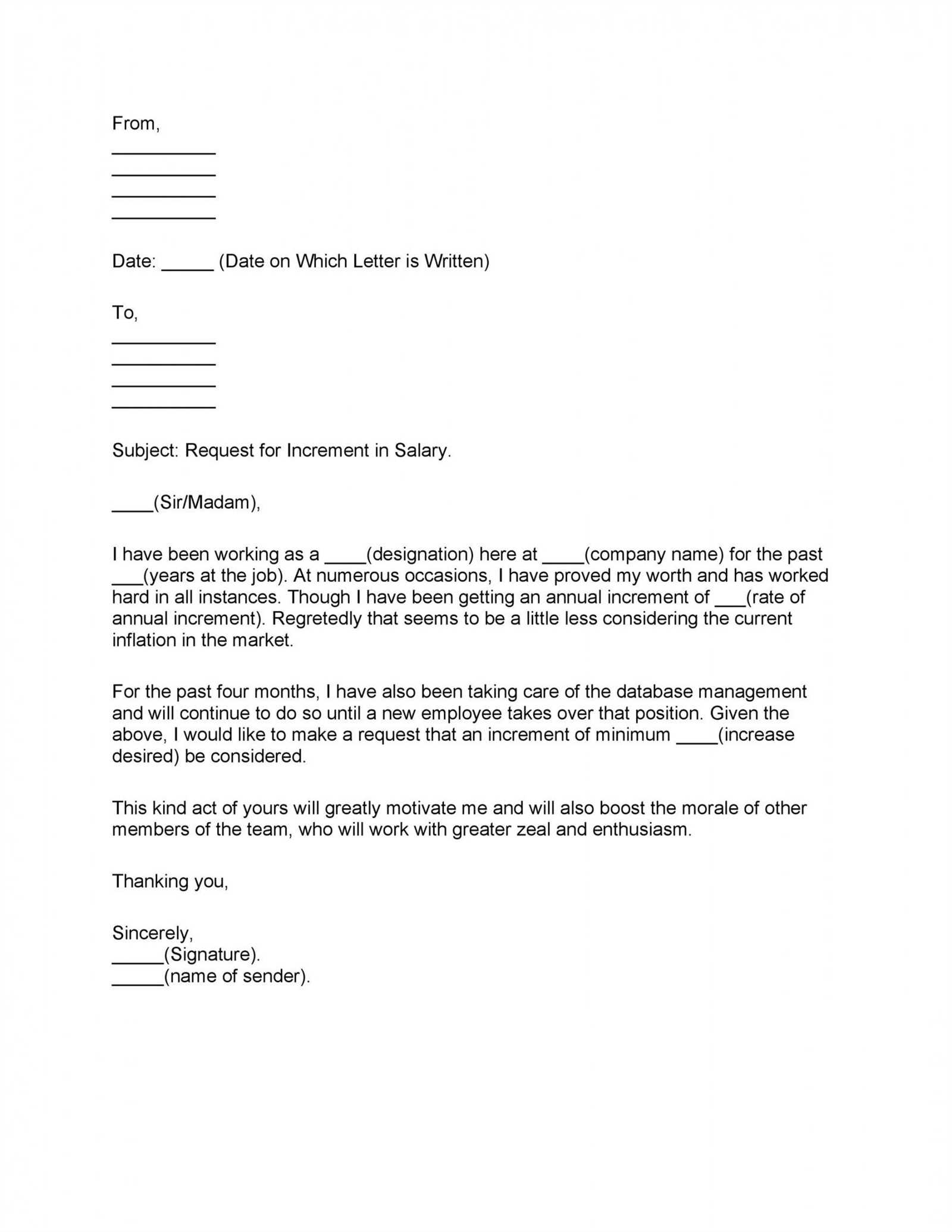
- Performance reviews: A scheduled performance evaluation is an ideal opportunity to discuss your achievements and request a change in compensation, as it aligns with company assessment periods.
- Company financial health: Ensure that the organization is in a stable financial position, as requesting an adjustment during a period of financial strain can negatively impact your request.
- Successful project completion: If you’ve recently completed a major project or reached a significant milestone, this can be a great time to highlight your contributions and request an adjustment.
- After market value research: Timing your request after confirming industry standards can help ensure your request is reasonable and competitive.
When to Avoid Making the Request
- During periods of budget cuts: If the company is going through cost-saving measures or layoffs, it may not be the best time to ask for an adjustment.
- Immediately after joining: While you may feel that you deserve a compensation increase early on, it’s important to first establish your value within the organization.
- When company morale is low: If the overall work atmosphere is negative or there are uncertainties within the team, it’s advisable to wait for a more opportune moment.
By strategically timing your request, you can significantly improve your chances of receiving a positive response while maintaining a strong, professional relationship with your employer.